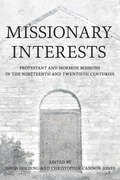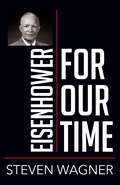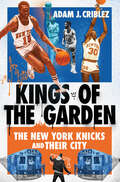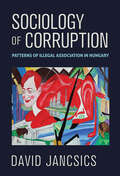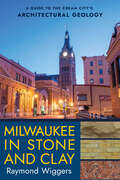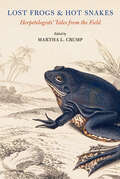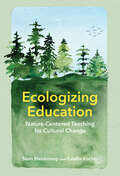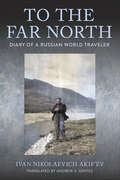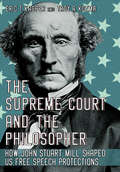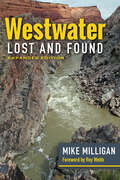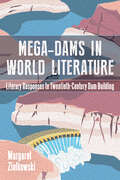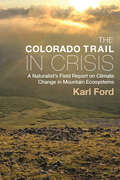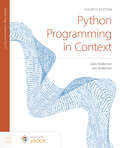- Table View
- List View
Missionary Interests: Protestant and Mormon Missions of the Nineteenth and Twentieth Centuries
by Edited by David Golding and Christopher Cannon JonesIn Missionary Interests, David Golding and Christopher Cannon Jones bring together works about Protestant and Mormon missionaries in the nineteenth and twentieth centuries, charting new directions for the historical study of these zealous evangelists for their faith. Despite their sectarian differences, both groups of missionaries shared notions of dividing the world categorically along the lines of race, status, and relative exoticism, and both employed humanitarian outreach with designs to proselytize.American missionaries occupied liminal spaces: between proselytizer and proselytized, feminine and masculine, colonizer and colonized. Taken together, the chapters in Missionary Interests dismantle easy characterizations of missions and conversion and offer an overlooked juxtaposition between Mormon and Protestant missionary efforts in the nineteenth and twentieth centuries.
Eisenhower for Our Time (People for Our Time)
by Steven WagnerEisenhower for Our Time provides an introduction to the Eisenhower presidency, extracting lessons for today's world. Steven Wagner proposes that the need to maintain balance defines Eisenhower's presidency. Wagner examines a series of defining moments that were among Eisenhower's greatest challenges, some of which resulted in his greatest accomplishments: the decision to run for president, his political philosophy of the "Middle Way," the creation of a national security policy, the French Indochina War, Senator Joseph McCarthy, the Little Rock Desegregation Crisis, the Race for Space, and the famous Farewell Address. Wagner looks at Eisenhower's executive ability, leadership, decision making, and willingness to compromise, as well as the qualities of duty, integrity, and good character. The moments detailed in Eisenhower for Our Time show Eisenhower as a president intimately engaged in the decisions that defined America in his time and that apply to ours today. The President's actions place him among the most successful presidents and provide many lessons to guide us in our time and in the future.
Kings of the Garden: The New York Knicks and Their City
by Adam J. CriblezIn Kings of the Garden, Adam J. Criblez traces the fall and rise of the New York Knicks between the 1973, the year they won their last NBA championship, and 1985, when the organization drafted Patrick Ewing and gave their fans hope after a decade of frustrations. During these years, the teams led by Walt Frazier, Earl Monroe, Bob McAdoo, Spencer Haywood, and Bernard King never achieved tremendous on-court success, and their struggles mirrored those facing New York City over the same span. In the mid-seventies, as the Knicks lost more games than they won and played before smaller and smaller crowds, the city they represented was on the brink of bankruptcy, while urban disinvestment, growing income inequality, and street gangs created a feeling of urban despair. Kings of the Garden details how the Knicks' fortunes and those of New York City were inextricably linked. As the team's Black superstars enjoyed national fame, Black musicians, DJs, and B-boys in the South Bronx were creating a new culture expression—hip-hop—that like the NBA would become a global phenomenon. Criblez's fascinating account of the era shows that even though the team's efforts to build a dynasty ultimately failed, the Knicks, like the city they played in, scrappily and spectacularly symbolized all that was right—and wrong—with the NBA and the nation during this turbulent, creative, and momentous time.
Sociology of Corruption: Patterns of Illegal Association in Hungary
by David JancsicsIn Sociology of Corruption, David Jancsics provides a fresh approach to the study of corruption in Hungary, which once seemed to be the most likely of the ex-communist bloc nations to catch up to the West and is, according to many experts and scholars, a country with a highly corrupt dynamic.Based on data from 2022, Hungary is now the most corrupt member state of the European Union. There is also a consensus among experts that a small clique of corrupt political actors has captured most Hungarian state institutions and a significant portion of the business sector. What fostered corruption in Hungary? What are the most typical forms of corruption in this country? What do Hungarians think about it? What is the role of prime minister Viktor Orbán in this? Sociology of Corruption proposes a novel sociological theory of corruption focusing on social status and relationships, network structures, and power dynamics as important explanatory factors of corrupt behavior. Although his focus is on Hungary, Jancsics's findings are applicable to other nations and cultural contexts.
Milwaukee in Stone and Clay: A Guide to the Cream City's Architectural Geology
by Raymond WiggersMilwaukee in Stone and Clay follows directly in the footsteps of Raymond Wiggers's previous award-winning book, Chicago in Stone and Clay. It offers a wide-ranging look at the fascinating geology found in the building materials of Milwaukee County's architectural landmarks. And it reveals the intriguing and often surprising links between science, art, and engineering. Laid out in two main sections, the book first introduces the reader to the fundamentals of Milwaukee's geology and its amazing prehuman history, then provides a site-by-site tour guide. Written in an engaging, informal style, this work presents the first in-depth exploration of the interplay among the region's most architecturally significant sites, the materials they're made of, and the sediments and bedrock they're anchored in. Raymond Wiggers crafted Milwaukee in Stone and Clay as an informative and exciting overview of this city. His two decades of experience leading architectural-geology tours have demonstrated the popularity of this approach and the subject matter.
Lost Frogs and Hot Snakes: Herpetologists' Tales from the Field
by Martha L. CrumpLost Frogs and Hot Snakes reveals the thrills and travails that herpetologists experience when working with amphibians and reptiles in the wild. With essays from fifty field biologists, this volume, edited by Martha L. Crump, presents a multifaceted yet intimate look at life in pursuit of knowledge about the natural world. From the beaches of Peru to the mountains of China, the stories in this collection place readers in the boots of field biologists as they watch, count, experiment, and survey. Some recall mishaps and misadventures—contending with leeches, dangling off a precipice while in a truck. Others tell of once-in-a-lifetime encounters—discovering a new frog species, spotting a rare snake. Together, these stories offer an understanding of what field biology is, what field biologists do, and how they go about doing it. Written with candor, warmth, and a dash of humor, the stories in Lost Frogs and Hot Snakes will encourage readers to appreciate the value of engaging with nature and of the amphibians and reptiles so critical to the vitality of our planet.
Ecologizing Education: Nature-Centered Teaching for Cultural Change
by Sean Blenkinsop Estella C. KuchtaEcologizing Education explores how we can reenvision education to meet the demands of an unjust and rapidly changing world. Going beyond "green" schooling programs that aim only to shape behavior, Sean Blenkinsop and Estella Kuchta advance a pedagogical approach that seeks to instills eco-conscious and socially just change at the cultural level. Ecologizing education, as this approach is called, involves identifying and working to overcome anti-ecological features of contemporary education. This approach, called ecologizing education, aims to develop a classroom culture in sync with the more-than-human world where diversity and interdependency are intrinsic.Blenkinsop and Kuchta illustrate this educational paradigm shift through the real-world stories of two public elementary schools located in British Columbia. They show that this approach to learning starts with recognizing the environmental and social injustices that pervade our industrialized societies. By documenting how ecologizing education helps children create new relationships with the natural world and move toward mutual healing, Blenkinsop and Kuchta offer a roadmap for what may be the most potent chance we have at meaningful change in the face of myriad climate crises. Timely, practical, and ultimately inspirational, Ecologizing Education is vital reading for any parent, caregiver, environmentalist, or educator looking for wholistic education that places nature and the environment front and center.
To the Far North: Diary of a Russian World Traveler (NIU Series in Slavic, East European, and Eurasian Studies)
by Ivan Nikolaevich Akif’ëvThis annotated translation of To the Far North presents the diary of a twenty-seven-year-old Russian physician who was part of the 1900 expedition to the Chukotka Peninsula to find gold. No other account so richly details life along the North Pacific Rim before World War I, especially from a Russian perspective. This volume relates the expedition's formation, development, and aftermath and offers unique insights on the region's place in both Russian policymaking and geopolitics. The illustrated diary includes picturesque descriptions of San Francisco, the Nome Gold Rush, Chukchi culture, Petropavlovsk, Vladivostok, and Nagasaki, Japan.Andrew A. Gentes's translation is based on an edition of Akifëv's book that was published in St. Petersburg in 1904. The diary shows how Russian and American views and cultural values clashed over a territory that is today more geopolitically important than ever. By documenting Akifëv's personal travels outside the expedition, To the Far North also demonstrates, in both human and personal terms, the role Russians played in shaping this region's history.
The Supreme Court and the Philosopher: How John Stuart Mill Shaped US Free Speech Protections
by Eric T. Kasper Troy A. KozmaThe Supreme Court and the Philosopher illustrates how the modern US Supreme Court has increasingly adopted a view of the constitutional right to the freedom of expression that is classically liberal in nature, reflecting John Stuart Mill's reasoning in On Liberty. A landmark treatise outlining the merits of limiting governmental and social power over the individual, On Liberty advocates for a maximum protection of human freedom. Proceeding case by case and covering a wide array of issues, such as campaign finance, offensive speech, symbolic speech, commercial speech, online expression, and false statements, Eric T. Kasper and Troy A. Kozma show how the Supreme Court justices have struck down numerous laws for infringing on the freedom of expression.Kasper and Kozma demonstrate how the adoption of Mill's version of free speech began with Justice Oliver Wendell Holmes Jr. more than a century ago and expanded over time to become the prevailing position of the Court today. The authors argue that this embrace of Mill's rationale has led to an unmistakable reorientation in the Court's understanding of free expression jurisprudence.The Supreme Court and the Philosopher is the first book to comprehensively explore how the political philosophy of Mill has influenced the highest court in the land. In targeting the underlying philosophical reasons that explain why the modern Supreme Court renders its First Amendment decisions, this book is particularly timely, as the issues of censorship and freedom of expression are debated in the public square today.
Westwater Lost and Found: Expanded Edition
by Mike MilliganWestwater Lost and Found: Expanded Edition is the continuing story of Westwater—a relatively short, deep canyon near the Utah-Colorado state line that has become one of the most popular river-running destinations in the Southwest—and its lasting significance to the study of the Upper Colorado River. Thousands of recreational river runners have pushed this backwater place into the foreground of modern popular culture in the West. Westwater represents one common sequence in western history: the late opening of unexplored territories, the sporadic and ultimately often unsuccessful attempts to develop them, their renewed obscurity when development doesn’t succeed, their attraction to a marginal society of dreamers and schemers, and the modern rediscovery of them due to new cultural motives, especially outdoor recreation, which has brought many people into thousands of remote corners of the West. This expanded edition brings to light historical events and explores how Westwater’s location greatly contributed to early Grand (Upper) Colorado River boaters’ knowledge and how the lush Westwater Valley and Cisco became critical stops for water, wood, and grass along the North Branch of the Old Spanish Trail. Other new additions include explorer Ellsworth Kolb’s unpublished manuscript describing his 1916–1917 boating experiences on the Grand and Gunnison Rivers; two stories relating to Outlaw Cave, one of which expands upon the mystery of the outlaw brothers; a letter from James E. Miller to Frederick S. Dellenbaugh in 1906 revealing new information about his boating excursion with Oro DeGarmo Babcock on the Grand River in 1897; and a portion of botanist Frederick Kreutzfeld’s little-known journal of 1853 that describes Captain John W. Gunnison’s railroad survey. Loaded with extensive information and river-running history, Milligan’s guide is sure to enhance readers’ knowledge of the Upper Colorado River and Grand Canyon regions. Boaters, river guides, scholars of the American West, and historians of the Colorado, Green, and Gunnison Rivers or the Old Spanish Trail will gain much from this new edition.
Mega-Dams in World Literature: Literary Responses to Twentieth-Century Dam Building
by Margaret ZiolkowskiMega-Dams in World Literature reveals the varied effects of large dams on people and their environments as expressed in literary works, focusing on the shifting attitudes toward large dams that emerged over the course of the twentieth century. Margaret Ziolkowski covers the enthusiasm for large-dam construction that took place during the mid-twentieth-century heyday of mega-dams, the increasing number of people displaced by dams, the troubling environmental effects they incur, and the types of destruction and protest to which they may be subject. Using North American, Native American, Russian, Egyptian, Indian, and Chinese novels and poems, Ziolkowski explores the supposed progress that these structures bring. The book asks how the human urge to exploit and control waterways has affected our relationships to nature and the environment and argues that the high modernism of the twentieth century, along with its preoccupation with development, casts the hydroelectric dam as a central symbol of domination over nature and the power of the nation state. Beyond examining the exultation of large dams as symbols of progress, Mega-Dams in World Literature takes a broad international and cultural approach that humanizes and personalizes the major issues associated with large dams through nuanced analyses, paying particular attention to issues engendered by high modernism and settler colonialism. Both general and specialist readers interested in human-environment relationships will enjoy this prescient book.
The Colorado Trail in Crisis: A Naturalist’s Field Report on Climate Change in Mountain Ecosystems
by Karl FordThe Colorado Trail in Crisis addresses the sweeping transformation of western forests and wilderness ecosystems affected by climate change. This book is equal parts trail journal and synthesis of natural and human history. Karl Ford uses research on climate impacts to forests, wildlife, hydrology, and more to stress the urgent need for an action plan to reduce greenhouse gases and save forests and watersheds. Using his hike along the popular five-hundred-mile Colorado Trail to present his personal observations about more than a hundred miles of dead and dying forest, Karl Ford presents a brief environmental history of these areas of the state, weaving in scientific studies about forest mortality caused by insect infestations, wildfire, drought, and loss of snowpack, and describes the poor current prospects for reforestation as the climate continues to warm. His own Lakota ancestry, as well as historical references to local Tabeguache Ute Chief Ouray and displaced Ute populations, meaningfully frames important conversations about caretaking and connection to place. Ford also proposes potential solutions to drought and forest mortality problems, as well as varying approaches and limitations to mitigation efforts. The Colorado Trail in Crisis appeals to hikers and nature lovers seeking to learn about the natural history, beauty, and serenity of the Colorado Trail, as well as students, conservationists, and scientists researching climate change effects on Colorado mountain ecosystems.
Python Programming in Context
by Julie Anderson Jon AndersonPython Programming in Context, Fourth Edition provides a comprehensive and accessible introduction to Python fundamentals. Updated with Python 3.10, the Fourth Edition offers a thorough overview of multiple applied areas, including image processing, cryptography, astronomy, the Internet, and bioinformatics. Taking an active learning approach, each chapter starts with a comprehensive real-world project that teaches core design techniques and Python programming to immediately engage students. An ideal first language for learners entering the rapidly expanding fields of computer science, data science, and scientific programing, Python gives students a solid platform of key problem-solving skills that translate easily across programming languages. This text is designed to be a first course in computer science that focuses on problem-solving, with language features being introduced as needed to solve the problem at hand.
